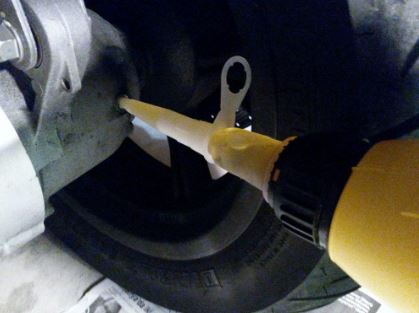When it comes to maintaining the health and longevity of your vehicle’s transmission system, it’s important to use the right lubricant. Gear oil and transmission fluid are two commonly used lubricants in vehicles, but many people are confused about whether they are the same thing. In this article, we will explore the differences and similarities between gear oil and transmission fluid to help you understand which one you need for your vehicle. So, if you’ve been wondering, “Is gear oil the same as transmission fluid?” keep reading to find out.
Gear Oil vs. Transmission Fluid: What’s the Difference

Gear oil and transmission fluid are both lubricants used in vehicles, but they are not the same. While they may seem interchangeable, using the wrong fluid in the wrong system can cause damage to the vehicle.
The main difference between gear oil and transmission fluid is their viscosity. Gear oil is much thicker than transmission fluid, with an average viscosity of 75w90 compared to the average 5w30 viscosity of motor oil. This high viscosity ensures that the full-gear train is completely lubricated, protecting the gears from wear and tear.
On the other hand, transmission fluid is a type of hydraulic fluid that focuses on the steering system. It is designed to work with automatic transmissions, while gear oil is typically made to work with manual-type gearboxes. Transmission fluid is also used as a coolant, transferring heat away from the mechanisms caused by friction and high pressure.
Another difference between gear oil and transmission fluid is their chemical composition. Gear oil is designed for manual transmissions, while transmission fluid is applied in automatic transmission systems of semi-trucks and other HD and light-duty vehicles. The type of HD transmission systems they are designed to lubricate and protect differs as well.
It is important to note that using the wrong fluid in a system can cause damage to the vehicle. For example, using gear oil in an automatic transmission system can cause damage to the system’s internal parts, leading to costly repairs. Always refer to the vehicle’s owner’s manual to ensure the correct fluid is being used.
In summary, gear oil and transmission fluid are not the same, and using the wrong fluid in a system can cause damage to the vehicle. Always refer to the owner’s manual to ensure the correct fluid is being used.
Properties and Functions of Gear Oil

Gear oil is a type of lubricant that is specifically designed to protect the gears in a manual transmission. It is a heavy-duty oil that is designed to withstand the extreme pressure and temperatures that are generated by the gears in a transmission.
One of the key properties of gear oil is its viscosity. Gear oil has a high viscosity, which means that it is thick and sticky. This allows it to cling to the gears and provide a protective layer of lubrication. The high viscosity of gear oil also helps to reduce friction between the gears, which helps to prevent wear and tear.
In addition to its viscosity, gear oil also contains a variety of additives that help to enhance its performance. These additives include anti-wear agents, corrosion inhibitors, and detergents. The anti-wear agents help to reduce wear and tear on the gears, while the corrosion inhibitors help to protect the gears from rust and other forms of corrosion. The detergents help to keep the gears clean by removing any dirt or debris that may accumulate over time.
Overall, the primary function of gear oil is to protect the gears in a manual transmission. It does this by reducing friction and wear, preventing corrosion, and keeping the gears clean. Without gear oil, the gears in a manual transmission would quickly wear out and fail, which could lead to costly repairs.
Properties and Functions of Transmission Fluid

Transmission fluid is a specialized lubricant that is used in automatic transmissions. It has a variety of properties and functions that are crucial to the proper functioning of the transmission system. Some of the key properties of transmission fluid include:
- High viscosity index
- Good thermal stability
- Low foaming tendency
- Good anti-wear properties
These properties are important because they help to ensure that the transmission fluid can effectively lubricate and protect the transmission system from wear and tear, friction, and heat. The high viscosity index helps to maintain the fluid’s viscosity over a wide range of temperatures, while good thermal stability helps to prevent the fluid from breaking down at high temperatures.
Transmission fluid also has several important functions, including:
- Acting as a hydraulic fluid to transfer power from the engine to the transmission
- Providing lubrication to the transmission system to prevent wear and tear
- Acting as a coolant to remove heat generated by the transmission system
- Helping to maintain proper friction and pressure within the transmission system
Overall, transmission fluid is a critical component of any automatic transmission system. It helps to ensure that the transmission system operates smoothly and efficiently, while also protecting it from damage and wear and tear.
Can Gear Oil be Used as Transmission Fluid
While gear oil and transmission fluid are designed to perform similar functions, they are not interchangeable. Gear oil is designed to lubricate and protect the gears and bearings in a manual transmission, while transmission fluid is designed to lubricate and protect the gears, bearings, and clutch in an automatic transmission.
Using gear oil in an automatic transmission can cause serious damage to the transmission. Automatic transmissions require a specific type of fluid with specific friction properties to operate correctly. Using the wrong type of fluid, such as gear oil, can cause the transmission to slip, overheat, and fail prematurely.
On the other hand, using transmission fluid in a manual transmission is not recommended either. Manual transmissions require a heavier, more viscous fluid to properly lubricate the gears and bearings. Using a lighter, thinner fluid, such as transmission fluid, can cause excessive wear on the gears and bearings and lead to premature failure.
Gear oil and transmission fluid are not interchangeable. It is important to use the correct fluid for your specific transmission to ensure proper lubrication and protection of the internal components.
Can Transmission Fluid be Used as Gear Oil
Transmission fluid and gear oil may be similar in some ways, but they are not the same thing. While both oils are used to lubricate moving parts, they are formulated differently to suit different types of transmissions or mechanical environments.
Transmission fluid is designed to work in automatic transmissions, which use hydraulic pressure to shift gears. It is thinner and more slippery than gear oil, which allows it to flow more easily through the transmission’s hydraulic system.
Gear oil, on the other hand, is thicker and more viscous than transmission fluid. It is specifically formulated to work in manual transmissions and differentials, which use gears to transfer power from the engine to the wheels. Gear oil is designed to protect the gears from wear and tear, reduce friction, and dissipate heat.
While it may be tempting to use transmission fluid as a substitute for gear oil, doing so could cause serious damage to the transmission or differential. Using the wrong type of oil can lead to increased wear and tear on the gears, reduced performance, and even complete failure of the transmission or differential.
It is always best to use the type of oil recommended by the manufacturer for your specific vehicle. If you are unsure which type of oil to use, consult your owner’s manual or a qualified mechanic.
FAQs About Is gear oil the same as transmission fluid
Can I use gear oil in place of transmission fluid?
No, it is not recommended to use gear oil in place of transmission fluid. Gear oil has a different viscosity and chemical composition than transmission fluid, and using the wrong type of fluid can lead to poor performance, increased wear and tear, and potentially costly repairs.
What happens if I use the wrong type of fluid in my transmission?
Using the wrong type of fluid in your transmission can lead to a number of problems, including poor performance, increased wear and tear, and potentially costly repairs. Always consult your vehicle owner’s manual and use the recommended type of fluid for your specific transmission.
Can I use transmission fluid in my wheel hub assembly?
No, transmission fluid is not designed to be used in wheel hub assemblies. Instead, use the recommended type of hub oil specified in your vehicle owner’s manual.
How often should I change my gear oil and transmission fluid?
The recommended interval for changing gear oil and transmission fluid can vary depending on the make and model of your vehicle, as well as your driving habits and conditions. Consult your vehicle owner’s manual for specific recommendations, but a general rule of thumb is to change the fluids every 30,000 to 60,000 miles.
Can I use different brands of gear oil or transmission fluid?
Yes, you can use different brands of gear oil or transmission fluid as long as they meet the recommended specifications for your vehicle. However, it’s best to stick to the same brand and type of fluid for consistency and compatibility.
Conclusion
After researching and analyzing the information, it is clear that gear oil and transmission fluid are not the same things. While they share some similarities in their use as lubricants, they are designed for different types of transmissions and have different chemical compositions. It is important to note that “is gear oil the same as transmission fluid” is a common question among vehicle owners, but the answer is a resounding no. Gear oil is primarily used in manual transmissions, while transmission fluid is used in automatic transmissions. Gear oil is thicker and has additives that help protect the gears from extreme pressure, while transmission fluid is a type of hydraulic oil that helps with shifting and cooling.
It is important to use the correct type of oil for your transmission to ensure it runs smoothly and efficiently. Using the wrong type of oil can cause damage to your transmission and result in costly repairs. When it comes to choosing between gear oil and transmission fluid, it is important to consult your vehicle’s owner manual or a trusted mechanic to determine the correct type of oil for your transmission. It is also important to regularly check and maintain your transmission fluid or gear oil levels to ensure optimal performance. Overall, understanding that gear oil and transmission fluid are not the same can help you make informed decisions about maintaining your vehicle’s transmission and avoiding costly repairs.
Related Topics:


